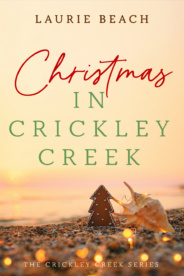Start reading this book:

Share This Excerpt
Chapter One
Emma Shea had a bag ready to go. She’d packed her most expensive items: her Prada oversized sunglasses, all four Louis Vuitton purses, and her collection of Chanel and Tory Burch dresses. What would happen to her three-carat wedding ring? Well, tradition dictated that, since she went through with the marriage, she’d get to keep it. She sat beneath the Christmas lights on the piazza. He’d paid five hundred dollars to have them strung. She chose the lights, of course, and handled the details of the project. Which is why she chose the color red. She hated red at all other times of year except for Christmas, when it suddenly became her preferred accent color.
It might have something to do with the fact that her husband, Trent Broadway, preferred white lights that hung like icicles. With him out of town all the time and Christmas lights nothing less than a requirement for the historic homes in downtown Beaufort, she found a way to sneakily piss him off. She’d been raised in the South, so she was good at inserting the knife and twisting it while looking as sweet and innocent as a kitten.
Who me? I would never. I just adore the color red. I had no idea my husband did not. What has gotten into that man?
The glowing lights on their symmetrical Classic Revival home were as screaming loud and as inappropriate as the red-light district in that Amsterdam place overseas somewhere. The lights made her feel better, like she’d vandalized perfection. They were her version of graffiti.
Emma sat twirling her fingers in her auburn hair. Auburn, because she refused to call it red. She’d found comfort in the soft, strong strands of her own wavy hair as long as she could remember. In many of her childhood photos, her fingers held a pinch of it as she rubbed the strands together, over and over. She spread the soft tresses across her lips—she needed comfort now.
It was just a few months past the one-year anniversary of her wedding, and the media had spilled her secret. LIVE5NEWS began the broadcast that afternoon with pictures of her in her couture wedding gown hugging her mother-in-law. They showed her kissing Trent at the altar and ended with several pictures of her working at the coffee shop, looking a little too happy and standing a little too close to Scruggs Willingham III. What had Emma Shea Broadway been doing in Crickley Creek only weeks before her wedding? Why was she working? And more importantly, who was the guy?
It was big news because her now-husband had plans to run for governor of South Carolina. At thirty, he’d be the youngest governor by far, beating out Nikki Haley by twelve years. Add to that the fact that Emma Shea, formerly Abernathy, was the Beaufort version of Paris Hilton—only rather than hotels, her grandparents, and now her parents, owned all of the Burger Kings and Zaxby’s in ten counties, and the pairing made for great ratings. One of the many downsides of kissing up to the press in order to get them to cover boring speeches and charity events was that they were teed up and ready to go as soon as they caught a whiff of scandal. Had Emma Shea Broadway been living a double life? The public wanted to know.
Emma Shea heard the door of the carriage house open and Trent’s new black Porsche pull in. She took a deep breath and tugged her fingers from her hair. Maybe putting up the red lights hadn’t been such a great idea.
Trent went straight to the piazza, as Emma knew he would. She sat there often, for the fresh air, for the comforting sounds of the frogs, crickets, and cicadas, and to get away from his whirlwind of energy, his constant phone conversations, and his too-loud laugh. She heard the squeak of the screen door and then the slam as he let it go.
A few seconds later, he stood tall and defined in his Dior suit and yellow bow tie, his face void of emotion except for the slight flare of his nostrils. His slicked-back hair made him look exactly like her daddy. The nighttime sounds seemed to grow louder, and she was afraid that if he said something, she wouldn’t hear him. But his words were as clear as the sky on the day they were married.
“I’m done.”
“I know,” she said, dropping her eyes to her hands in her lap.
“You need to leave.” His tone sounded like he was telling a waiter there was a fly in his water. He didn’t even give her the satisfaction of anger—that would have meant he cared.
“I know,” she said again, motioning to the suitcase next to her chair. She was the one in the wrong, so it was clear that she must be the one to give up her comfortable home on the edge of the Beaufort River.
“I’ll have my lawyers draw up the papers.”
“I’ll just take my car,” she stood, surprised at how wobbly she felt.
“Fine.” He took two steps backward.
It was strange how she felt compelled to hug him. Despite a year of acting happily married to the world while awkwardly ignoring each other in private, it seemed the right thing to do. Finally, they’d given in to the misery and gotten to goodbye. It felt like the one true thing they’d accomplished together. And, somehow, that seemed worthy of a hug. But the same thing that held her back from embracing their marriage held her back from the hug as well. It was her. If she thought she was supposed to hug him, she’d hug him. But it wasn’t clear what propriety, or her heart, called for in that instance. She stood in front of him wondering what to do, at battle with herself. So she did nothing.
He turned around and walked inside, letting the screen door slam again.
“Goodbye, Trent,” she whispered. He hadn’t always been awful. There was a time when they’d been good friends, when they’d laughed and planned for their future and marched into events like royalty, knowing they were the couple that everyone envied. From the silk-lined pocket of her black pants, she pulled out a key. On one side of the degrading yellow plastic key ring was an advertisement for a savings and loan, and on the other side was an address: 19 Blue Ghost Lane, Crickley Creek.
Of all the places. It probably wasn’t smart to go back to Crickley Creek when the press was swarming like locusts. But aside from crashing at a friend’s house or finding a hotel, it was her only option. She put the key back in her pocket and dragged her suitcase down the steps—thunk, thunk, thunk—to her car.
The headlights of her Mercedes SUV shone bright on the street ahead, and she found herself smiling at the familiar route back to the tiny town. Trent Broadway didn’t feel real, like the past year of her life was a badly written chapter she’d just torn from the book and thrown into the trash. She felt nothing, except for a healthy dose of guilt about feeling nothing. She should probably be heartbroken or embarrassed or at the very least, filled up with shame and regret. But the one thing she knew for sure was that she wasn’t any of those. Not one bit.
Her GPS took her through downtown Crickley Creek, past Tea and Tennyson. She slowed down to look inside, but it was dark. Even the upstairs window where her co-worker, Krista, used to live seemed completely uninhabited. What had she expected? That it would be bright and happy and filled with people drinking coffee and reading books at nine o’clock on a Friday night? They closed at four, for God’s sake.
She exited the red-brick downtown as quickly as she arrived, heading toward the peninsula on the outskirts of town, right before Katu Island. There were five short streets there with the creek and the marsh on the left and the Atlantic on the right. Her GPS led her to the street on the far right, and she drove slowly along the beach past a line of old homes. She knew enough about the sea islands to identify the historic ones—some were probably built back when the plantation owners would escape the summertime heat by heading to their homes on the ocean. She counted the numbers on the mailboxes until she landed on sad little number nineteen. It was the most overgrown plot of land, with a dilapidated house painted mossy green sitting right up against the street. She couldn’t even see the front door for the big crepe myrtle badly in need of a trim and the masses of ferns and elephant ears. She pulled onto the short gravel driveway and put the car in Park. There was only an open carport, no garage, which meant her new Mercedes would be subject to the ravages of salty air. Clearly, she wouldn’t be staying in the falling-apart mystery house long.
The fact that the house even existed was strange. Her mother had stopped by after the salacious news first hit and handed her daughter the key. “Stay here,” she said. “It’s mine.” She patted her daughter’s hand and shot her a look of sympathy before dashing back to her car. “Do not tell your father where you are.” That was it.
Emma shouldn’t have been surprised. There were so many secrets in her family, it was no wonder she’d spent her entire life having no idea her mother owned an ancient beach house in Crickley Creek.
The neighborhood was quiet, and the steady swoosh of waves hit nearby like the ocean knew she’d arrived and was trying to move up the beach to greet her. She used her cell phone flashlight to illuminate the way as she stepped carefully over weeds in between the flagstone leading to the front door. Just as she pulled out the key, she saw something move on her left. On the rim of a bright red pot filled with the remnants of a dead plant was a fuzzy black caterpillar, a woolly bear. Emma knew what that meant: the blacker the woolly bear, the longer and snowier winter would be. Of course, South Carolina rarely saw snow, especially in the Lowcountry, so it surely meant nothing.
She put the key in the lock. It worked.
End of Excerpt










